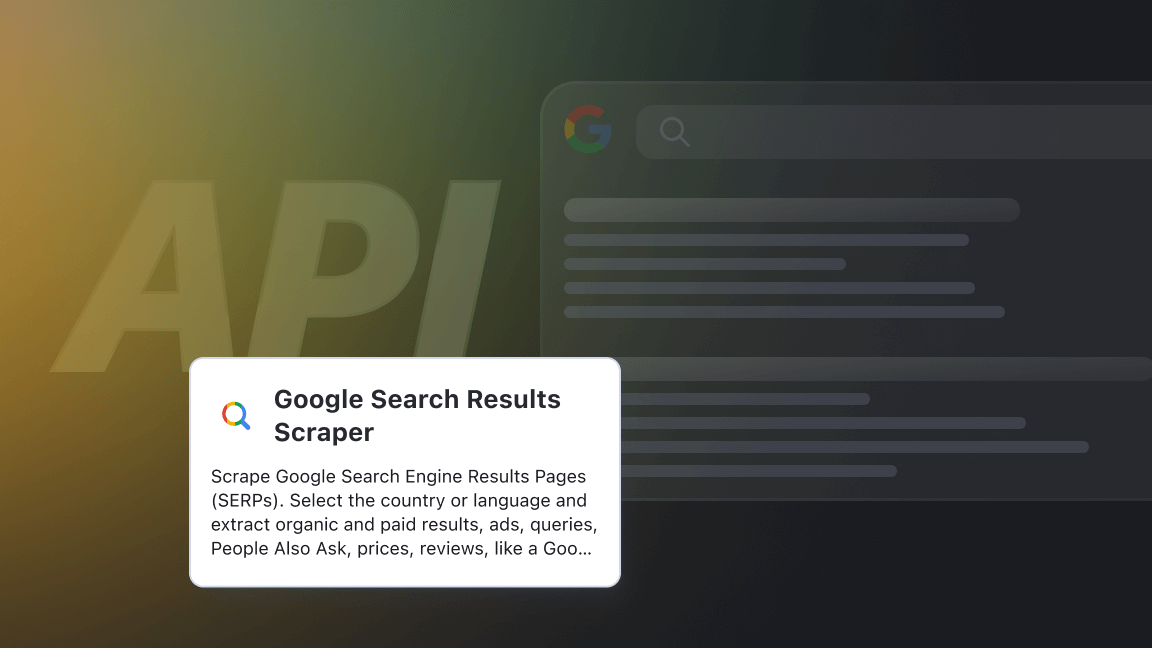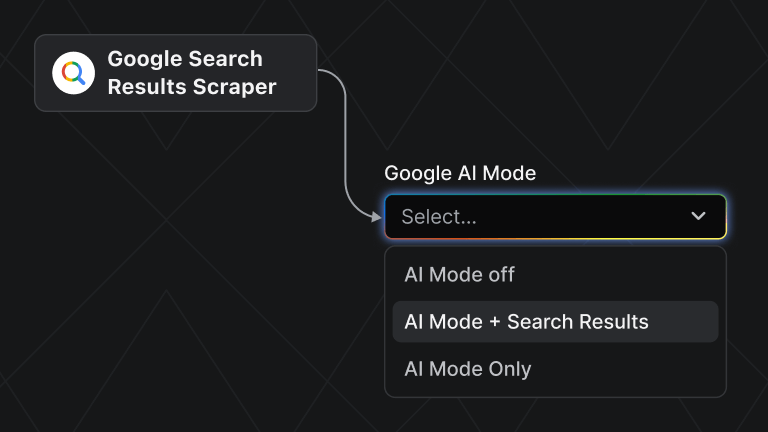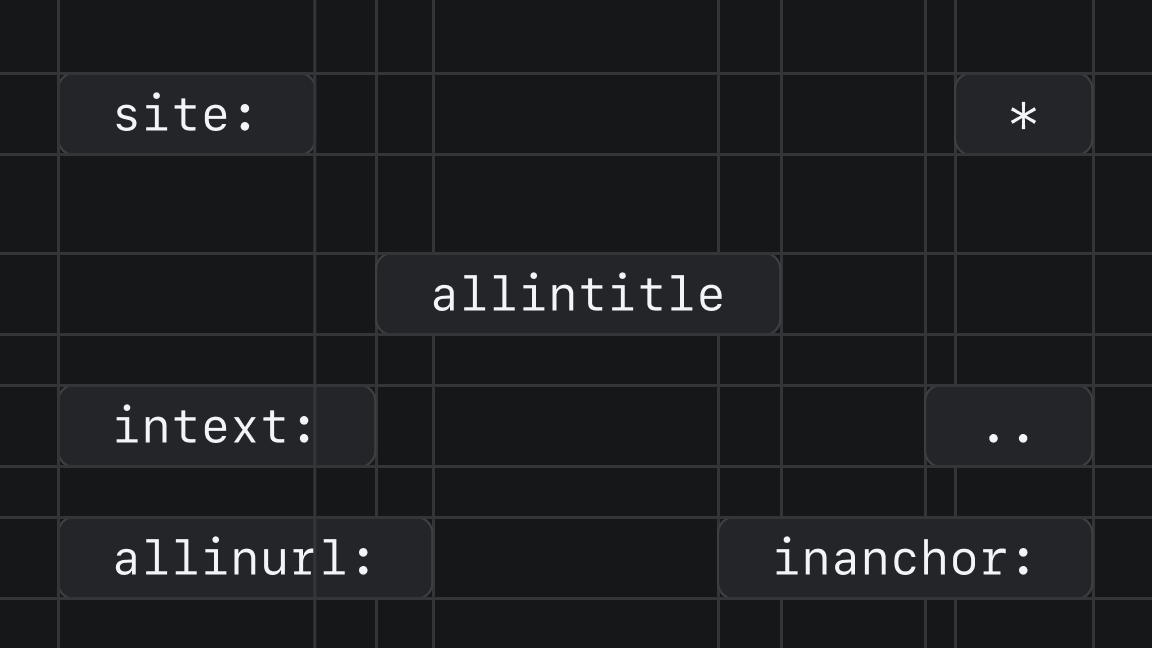As a sales or marketing professional, business growth lead, or event manager, you probably already use Google Maps to find qualified leads and build targeted prospect lists.
If you want to avoid clicking through search results or wrestling with Google Maps API's restrictive limits, you need the best Google Maps scraper on the market, able to:
- Pull complete business details without missing data.
- Bypass Google Maps’ search limits to capture more than 120 results.
- Export clean data, ready to feed your CRM.
- Scale to thousands of leads without manual effort.
To help you cut through the noise, we’ve compared 5 of the best Google Maps scrapers on the market:
- Apify
- Outscraper
- Phantombuster
- Map Lead Scraper
- Octoparse
The best Google Maps scrapers: Quick comparison
| Tool | Cost | Free trial / free tier | Limitations | Company Trustpilot ranking |
|---|---|---|---|---|
| Apify’s Google Maps Scraper | Pay per event, $4 per 1,000 places | Use $5 credits each month; no credit card required | Reliant on Apify’s updates | 4.8 |
| Outscraper’s Google Maps Scraper | Pay as you go, $3 per 1,000 places up to 100k; $1 per 1,000 places above 100k | Free tier = first 500 businesses per month | Slow, with most queries about 400 results taking 20–25 minutes | 4.7 |
| Phantombuster’s Google Maps Search Export | Subscription from €69/mo for 20h execution time | 14-day trial with 2h execution time | ~120 listings per query limit; no proxies | 3.7 |
| Map Lead Scraper | $19.9/mo for 100,000 leads exported | Free monthly leads export 1,000; 15 records at a time | Works as a Chrome browser extension only | 3.3 |
| Octoparse Google Maps Scraper | From $83/mo, $1.5/1,000 lines | Free trial with 10 tasks up to 10K data per export | ~120 listings per query limit; no proxies | 3.5 |
1. Apify Google Maps Scraper
Apify’s Google Maps Scraper lets you scrape all available data on the Google platform without limits or quotas. Extract various details like names, contact info, reviews, popular times, ratings, geolocation, and more. You can scrape by search query, location, coordinates, or URL, targeting a few places, a city, or an entire area.
Pros
- Cloud-based: Runs on Apify’s infrastructure, can be scheduled, integrated, and automated via API.
- Built specifically to bypass the ~120 results/search restriction with custom search areas.
- Delivers clean JSON, Excel, or CSV export formats.
- Integrates well with workflows - You can integrate your Google Maps data with Zapier, Slack, Make, Airbyte, GitHub, Google Sheets, Asana, LangChain and more.
- Free plan includes $5 in platform credits monthly.
- Pay per event pricing model: no subscription cost.
- Enrichment features available: The company contacts enrichment feature scans the target website and finds all emails, phone numbers, and social media links, and attaches them to the dataset.
Cons
- Costs can rise at scale: with $4 per 1,000 records + $0.007 Actor start. Add-ons such as applied filters or company contacts enrichment cost extra.
- Reliant on Apify’s updates: If Google changes the DOM or API, you depend on Apify’s devs to do the fixes.
Getting started
You can start using Google Maps Scraper by clicking the try for free button. After creating an Apify account, you receive $5 in platform credits, which renew automatically every month.
To run the scraper, choose your location and add a search term to get your Google Maps data. It’s also possible to define the search area or use URLs instead of a search term.
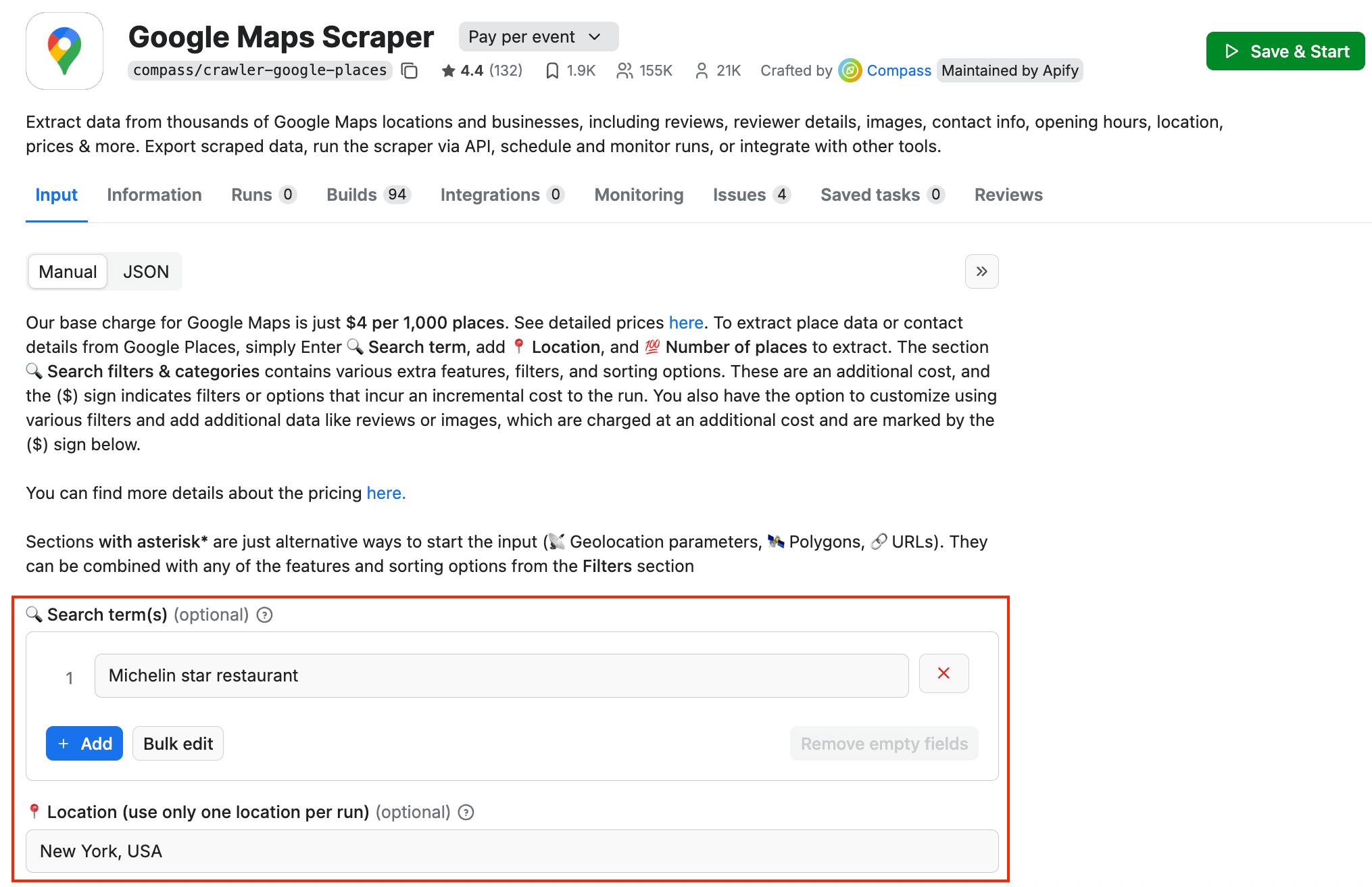
There are many other filters to choose from to customize your scraping tasks:
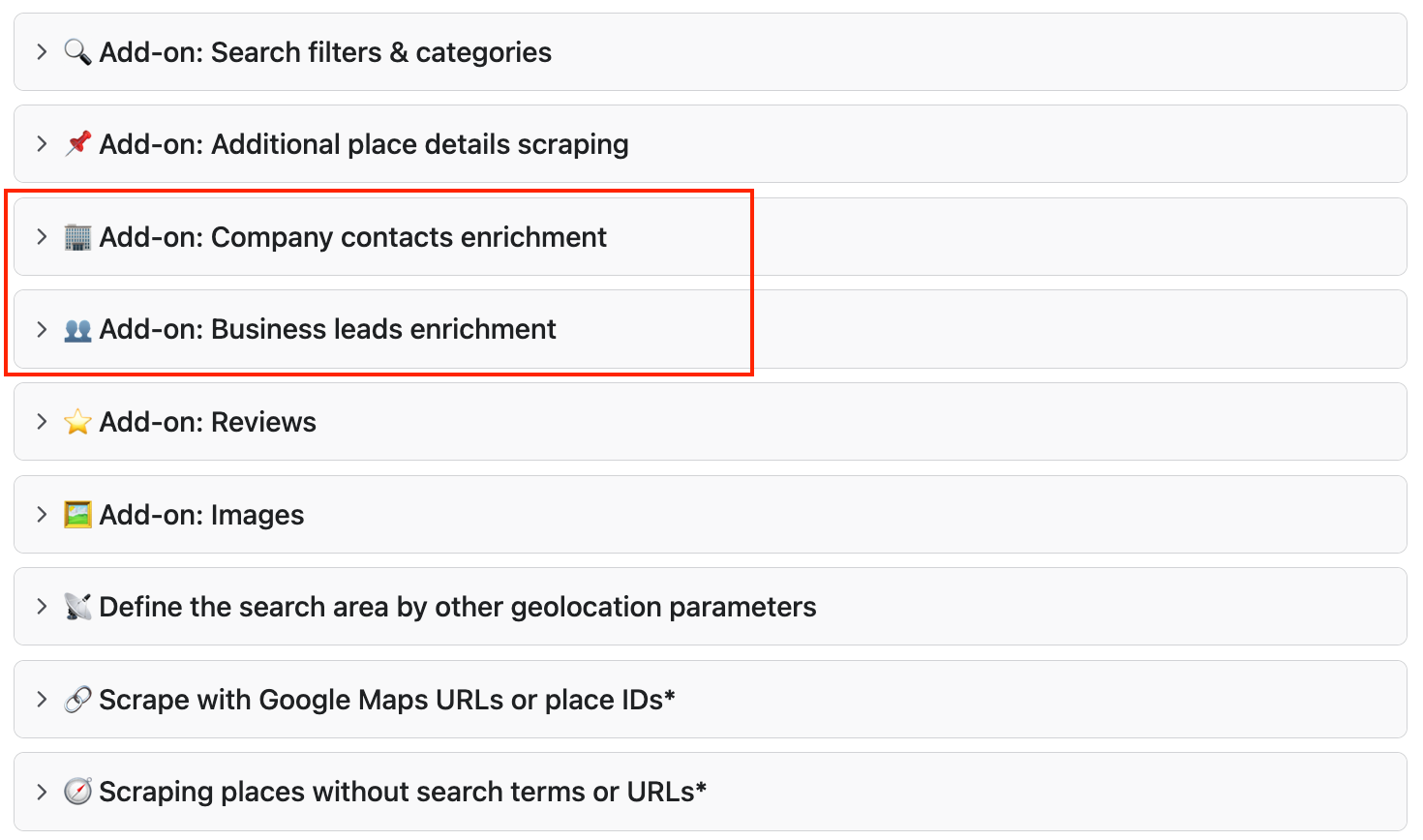
With the Company contacts enrichment add-on, the scraper doesn’t just pull business listings - it also uncovers contact details from the company’s website. This can include emails, phone numbers, and links to social media accounts. On paid tiers, you can go even further with the Business leads enrichment feature, and tap into a broader database of employee data, providing insights such as headcount, staff names, and other business details. You can even filter by department, e.g. C-Suite, HR, or Product.

Apify Google Maps Scraper expands Google Maps data extraction beyond the limitations of the official Google Places API and bypasses the limitation of Google Maps of displaying (and scraping) no more than 120 places per area. It’s easy to set up in Apify Console and delivers clean datasets in several formats.
2. Outscraper Google Maps Scraper
Outscraper’s Google Maps Scraper extracts key business data such as names, addresses, phone numbers, website links, coordinates, hours, and ratings. It supports lead generation and market analysis by automating data collection based on location or search queries.
Pros
- Pay-as-you-go pricing: $3 per 1,000 results from 501 to 100k places
- Free tier: 500 businesses/month free.
- Can be integrated into workflows and CRMs.
- Cloud-based; runs entirely on their infrastructure.
Cons
- Very slow, with most queries about 400 results taking 20-25 minutes.
- Limited functionality and filters (no deep scrape for reviewer data).
- No flat unlimited plan: If you scrape constantly, pay-as-you-go costs may spike.
- Limited transparency: Outscraper is closed-source.
Getting started
Create an account and log in to the Outscraper platform to run the scraper. First, you pick one of the 500 categories of places you want to export and select pre-defined locations. Alternatively, you can switch to a plain query search. For additional enrichment options, you have to buy one of the packages offered.
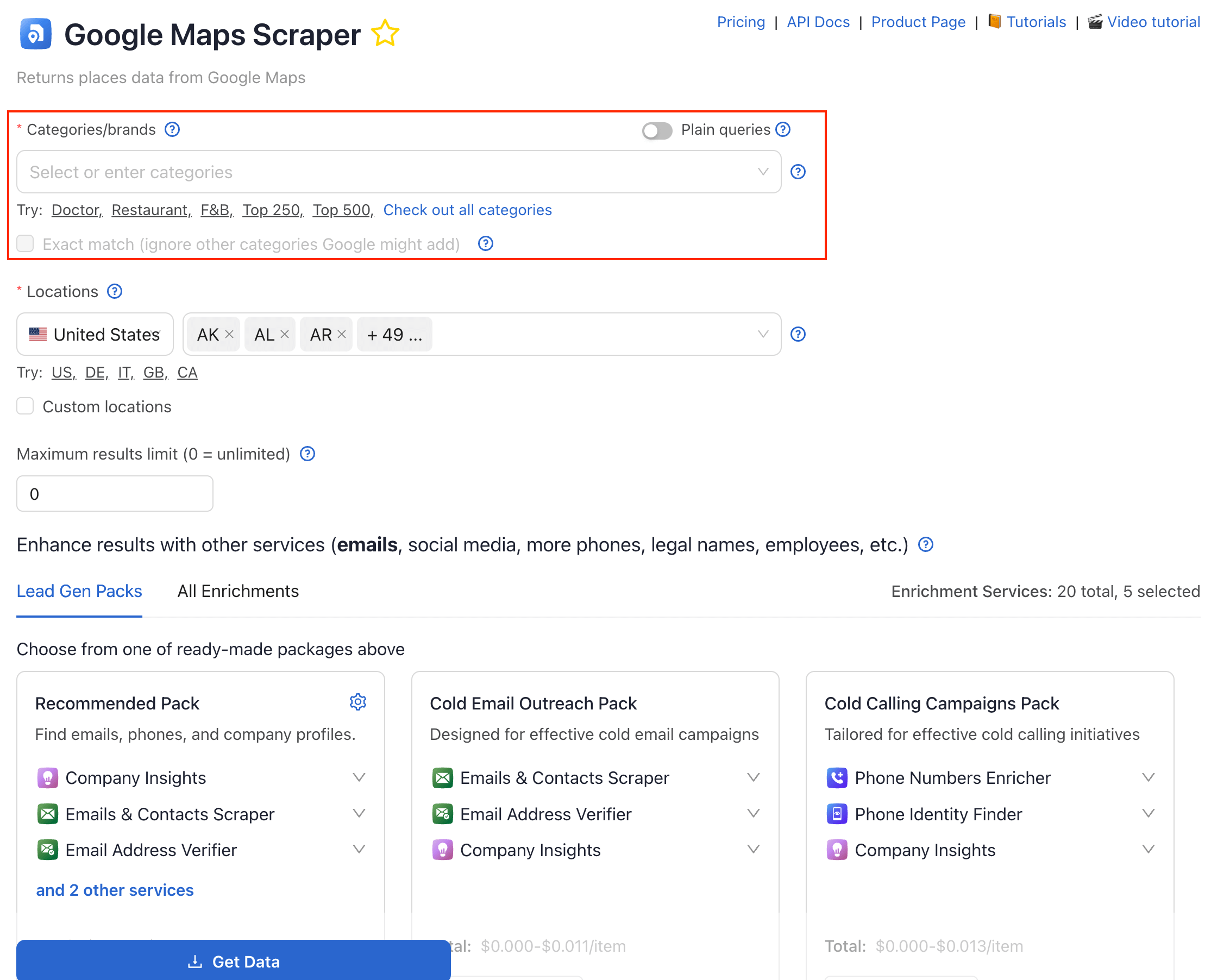
Outscraper also offers filtering options: If you want to look for closed businesses, you can add an Active Filter by selecting business_status, and decide whether you’re interested in business closed permanently or temporarily, or both.

With Outscraper’s Google Maps Scraper you can collect business information on a pay-as-you-go model with a small free tier and tiered pricing that decreases at higher volumes.
3. Phantombuster Google Maps Search Export
Google Maps Search Export automatically scrapes and exports the results of a Google Maps search into a spreadsheet in just a few easy steps. It does this in the cloud, so you don’t need to have your browser open or your computer on for it to work. The tool does not extract more than 120 results per search. Still, you can circumvent this limitation by making your location search criteria more granular and using multiple different searches within the same area.
Pros
- Easy setup in Phantombuster’s web dashboard.
- Automation is easy to handle - you can schedule exports daily/weekly.
- Natively connects with CRMs.
- Runs in the cloud.
Cons
- There is a 120 results/search cap.
- You can only export 10 rows on the free plan.
- Subscription pricing starts at $69/month for 20 hours of execution time with monthly billing, which is costly if you just need one-off scrapes.
- The starter plan gives only 2 hours/month of runtime - large exports may either stall or fail.
- No options for Google login.
Getting started
After creating an account, you can easily run the scraper. You pick one of the starting points: keywords, URLs of the search, or URLs of a document with a keyword list in Google Sheets or CSV format.
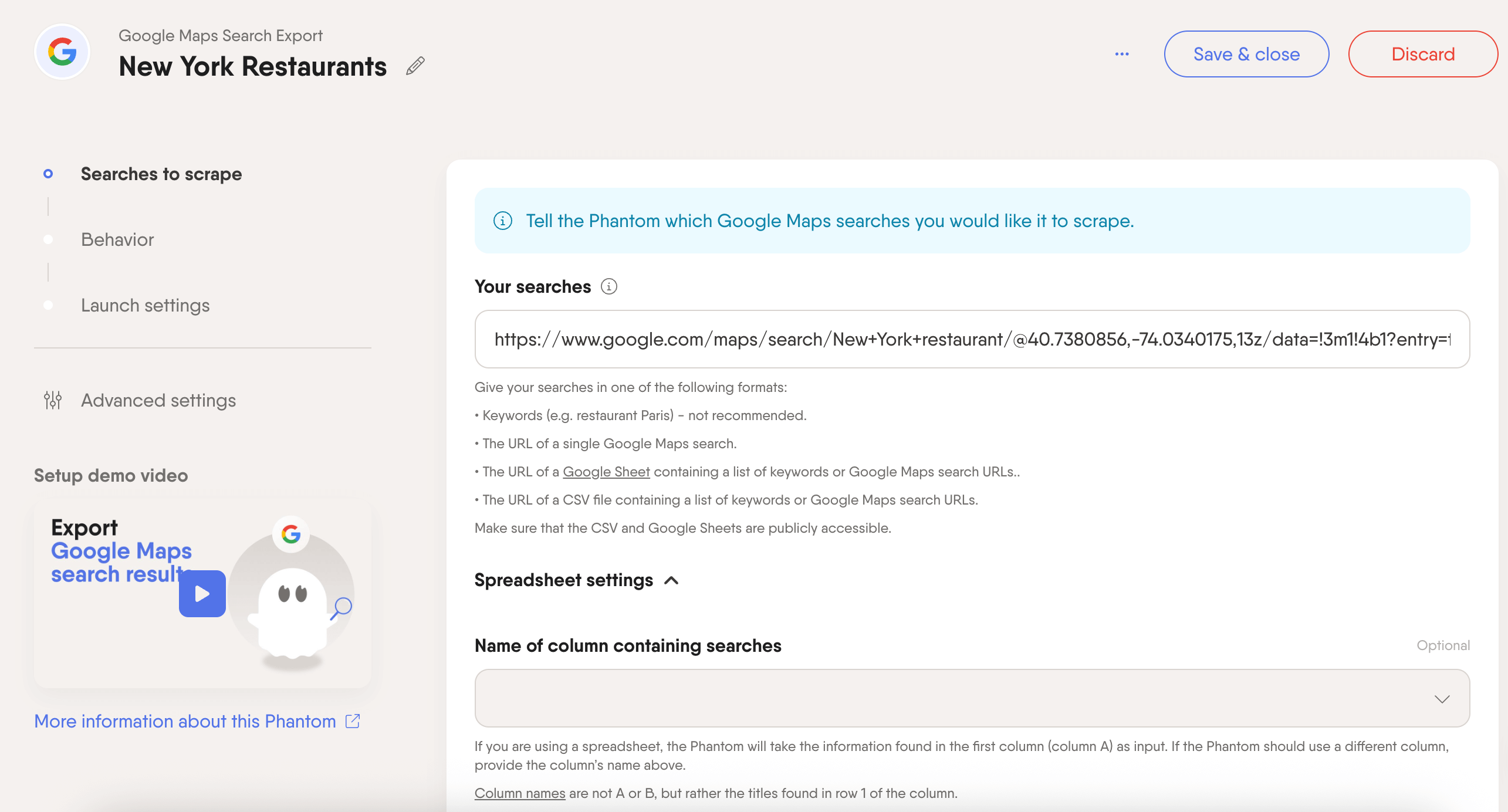
As with Apify's scrapers, you create and name a task, input URLs or other details in the search field, and you can either run the task manually or create a schedule for it to run automatically.
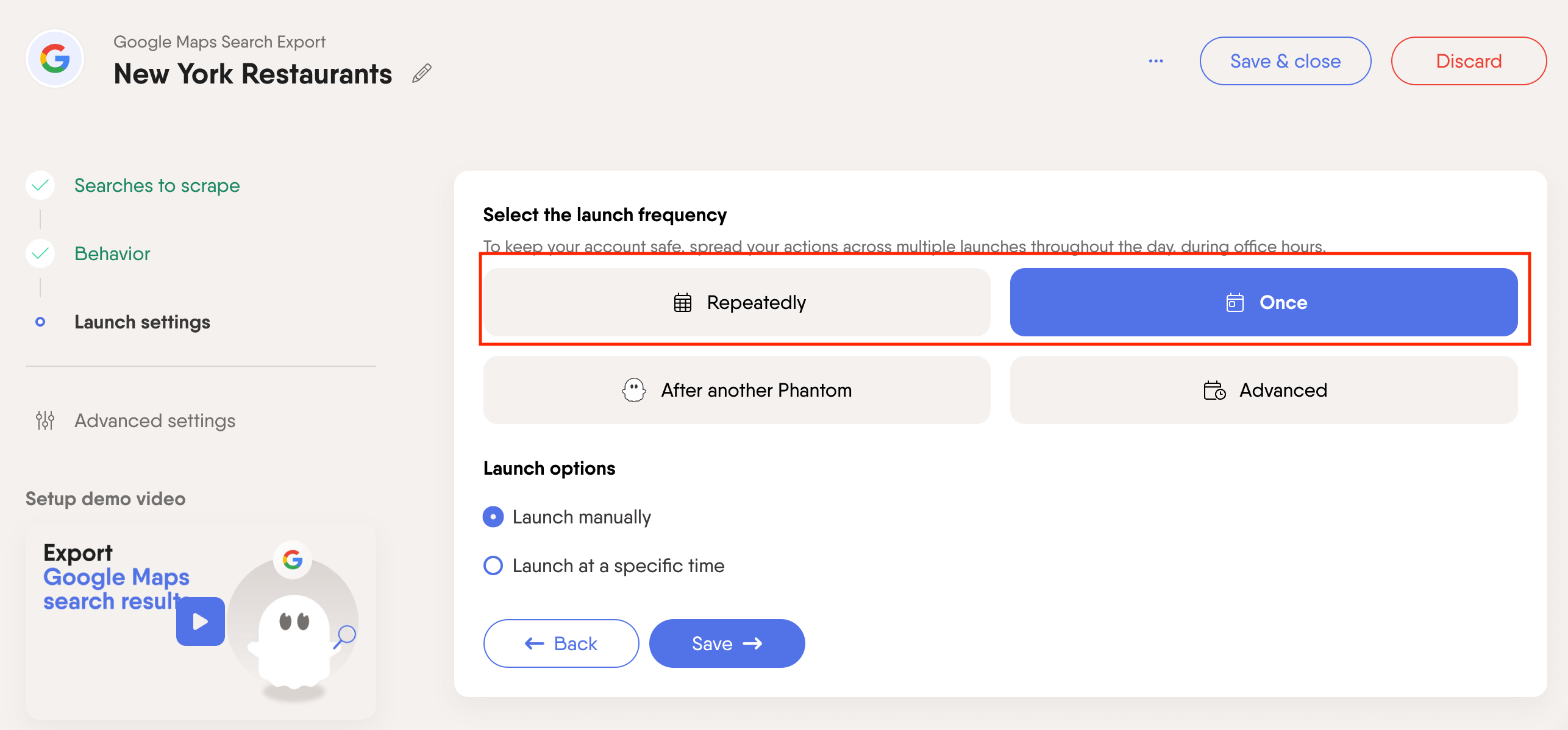
While it’s easy to set up and run, Phantombuster Google Maps Search Export’s pricing model might be a main disadvantage for some - you essentially pay for execution time, not results. Whether you export 2 or 200 leads, you pay the same.
4. Map Lead Scraper
This Google Maps scraper is a browser extension that can run on any operating system, as long as you have the Chrome browser installed. It extracts business listing data like names, emails, and phone numbers that can be used to generate sales leads and grow a customer database.
Pros
- Low-cost solution with a free tier of 1,000 leads/month.
- Quick setup - simple Chrome extension, no infrastructure required.
- Easy export to CSV/Excel.
- Useful for small-scale users scraping a few hundred leads at a time.
Cons
- Runs inside your browser, so it requires manual input: you must trigger searches yourself.
- Chrome can freeze/crash when exporting hundreds of records.
- 120 results/search cap: Like Phantombuster, it inherits Google Maps’ UI restriction.
- No automation options: It can’t be integrated into workflows.
Getting started
To start working with the Map Lead Scraper, you need to download and unpack the Chrome extension. Then you open Chrome and enable the developer mode. After loading the package into Chrome, the extension is ready to use. You can log in with your Google account and start scraping immediately.
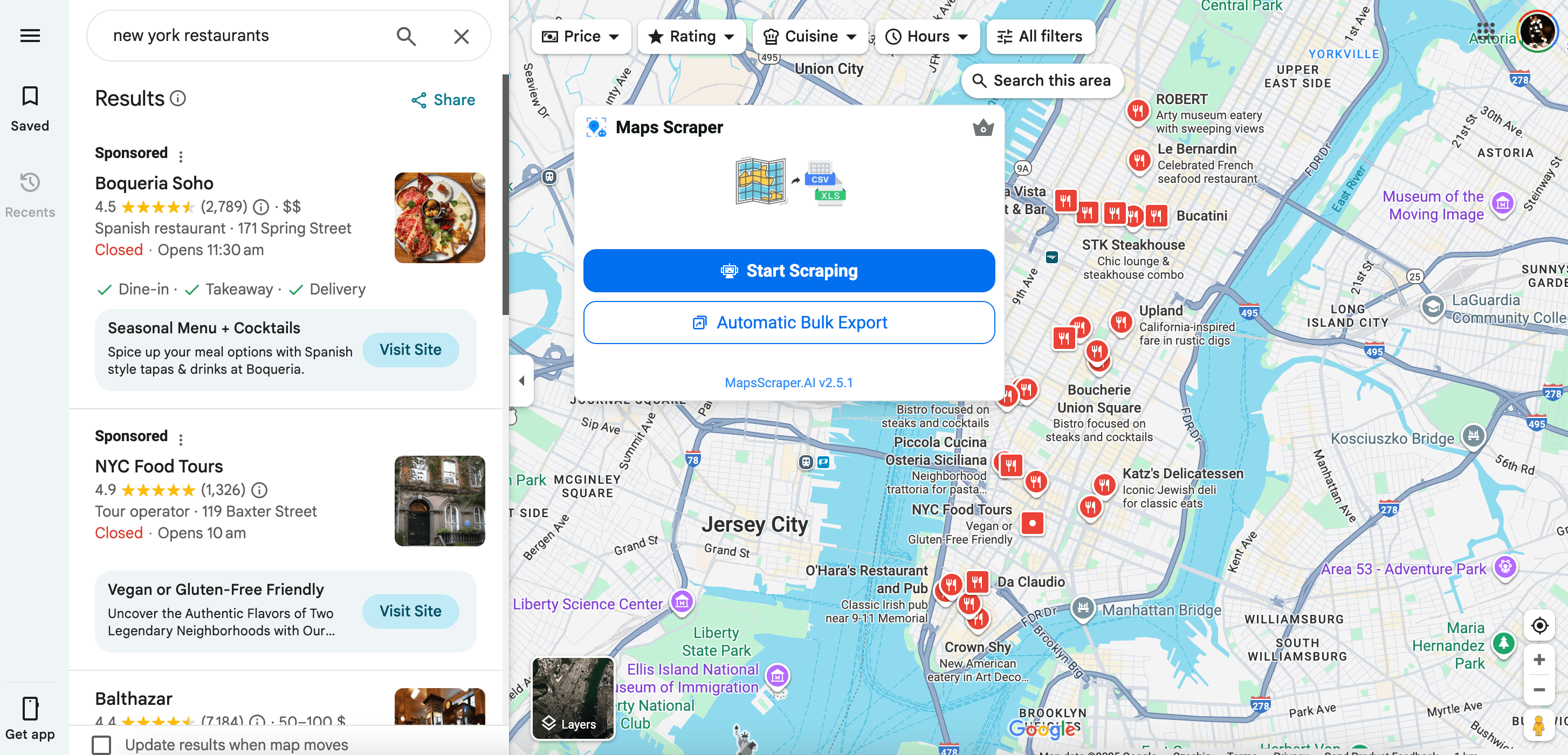
Map Lead Scraper is easy to use and works well for one-off scraping tasks. Without automation features or integration options, it’s a good choice for users who don’t need to run data collection at scale.
5. Octoparse Google Maps Scraper
Octoparse Google Maps Scraper is available in the Octoparse desktop app, allowing you to scrape data such as names, contact info, ratings, geolocation, images, reviews, prices, and more from Google Maps. You can scrape by keywords, URLs, location, and language, and export the data in CSV, Excel, or JSON formats.
Pros
- Easy setup with a point-and-click workflow builder.
- General-purpose scraper that isn’t limited to Google Maps.
- Paid plans offer cloud execution.
- Supports CSV, Excel, JSON, Google Sheets, and API connections.
- Integrates with Zapier, Google Sheets, and databases.
Cons
- High cost with Standard Plan pricing starting at $83/mo
- Free plan is limited to 10 tasks, 2 concurrent runs
- IP proxy, CAPTCHA-solving, or premium template usage aren’t included in the standard plan and require additional credits.
- Pre-built templates are restricted to paid plans
- Free trial is available only with credit card details.
Getting started
To start scraping with Octoparse, you need to set up your account and download the Octoparse desktop app. Running the scraper in the browser is possible, but automation features are only available in the desktop app. You can use a ready-to-use Template Task for Google Maps to start scraping.
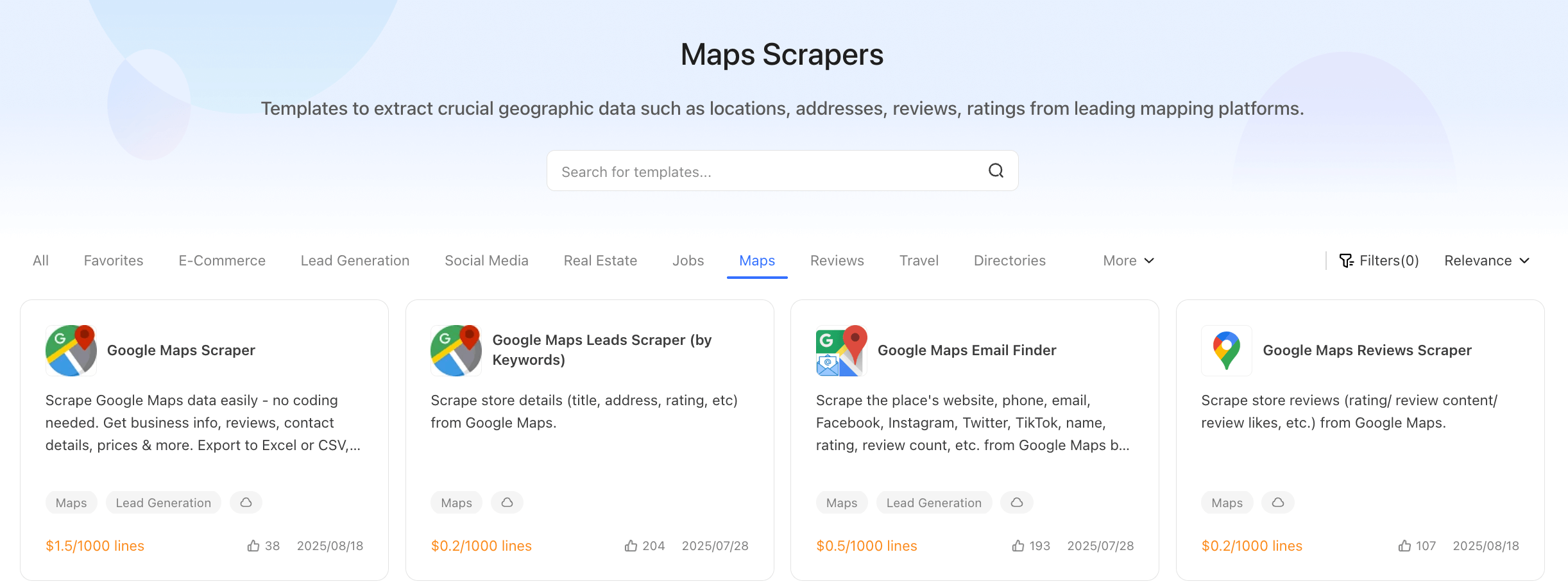
Octoparse Google Maps templates are pre-configured, no-code scraping workflows designed specifically for Google Maps. They allow users to quickly extract rich business and location data without manual setup, coding, or detailed configuration. With the Google Maps Scraper template, you just need to enter a keyword or a Google Maps URL and wait for the data to be extracted.
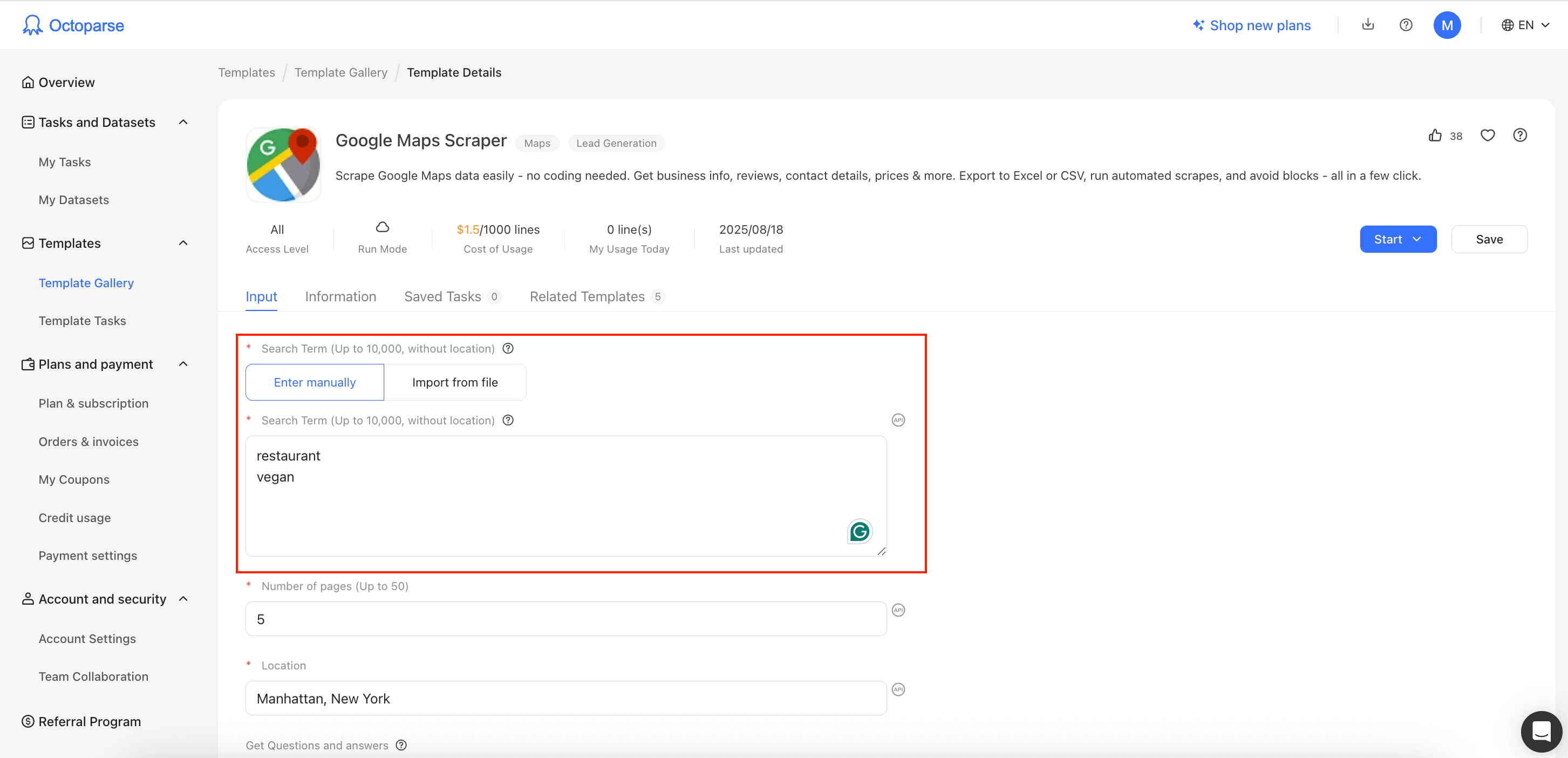
Octoparse Google Maps templates work well for extracting structured, detailed business and review data from Google Maps. You can choose search methods (keywords vs URLs) or data types (reviews vs listings).
How marketers scale lead gen with Apify
Choosing the right Google Maps scraper depends on what matters most to your workflow. When it comes to lead generation for marketers, Apify is a standout solution, combining automation, proxy management, and scheduling to deliver both speed and scale, with over 10,000 ready-made Actors offered on Apify Store.
iTrinity’s experience makes compelling proof: their team saw strong affiliate traffic from YouTube and wanted to scale it. Apify’s marketplace of web scraping and automation tools allowed them to:
- Scrape contact emails from YouTube channels using off-the-shelf scrapers.
- Automatically validate email addresses using a custom-built solution.
These automation flows replaced hours of daily manual work with scalable, repeatable processes. The result? They boosted their outreach from just 50 to 400 emails per week, all while saving over 40 hours of manual work.
If your goal is to streamline your workflow and scale your lead gen operations, Apify offers a user-friendly platform worth consideration.
Note: This evaluation is based on our understanding of information available to us as of January 2026. Readers should conduct their own research for detailed comparisons. Product names, logos, and brands are used for identification only and remain the property of their respective owners. Their use does not imply affiliation or endorsement.
FAQ
Is scraping Google allowed?
It is legal to scrape publicly available information from Google, but that doesn’t mean you should scrape personal data without a legitimate reason. Make sure that you do not breach data protection laws, and consult the Google Maps Platform Terms of Service. If you want some solid guidance on the legality and ethics of web scraping, Is web scraping legal? is a comprehensive treatment of the subject.
What data can you extract from Google Maps?
With a Google Maps scraper, it’s possible not only to scrape Google business listings but to extract all data on the platform. Below are just a few examples of the data you can scrape.
- Titles, categories, and URLs
- Addresses, locations, and coordinates
- Phone numbers and websites
- Open and closed statuses and popular times
- Menus and prices
- Ratings and reviews



